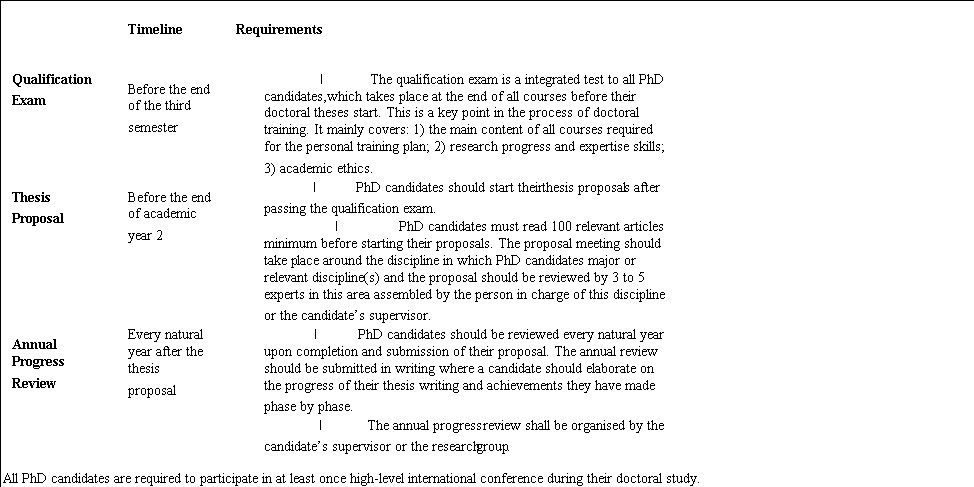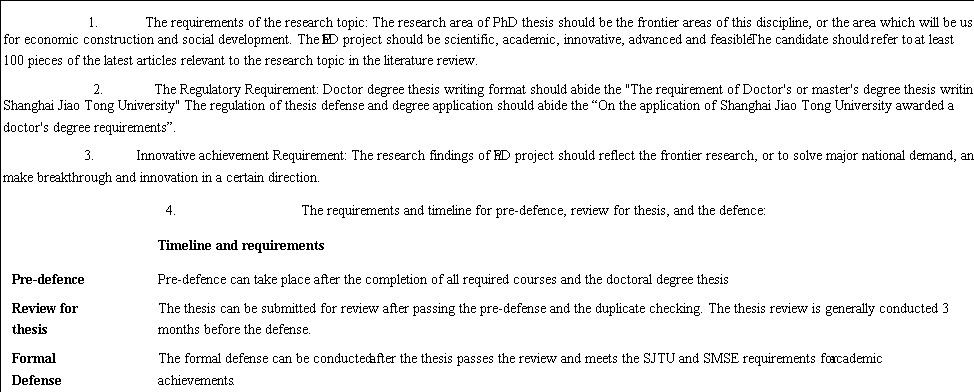Doctor Degree Program of Materials Science and Engineering(major code:080500)
The program of Materials Science and Engineering (MSE) in Shanghai Jiao Tong University (SJTU) has been consistently remained in national top 5, especially No. 1 in 2003, as evaluated by the Minister of Education. In 2007, MSE in SJTU was authorized as the first-class National Key Discipline. MSE program of SJTU ranked 20 in 2021 QS world university ranking and has been listed in the world top 1‰ discipline of ESI for years.
MSE has nearly 100 doctoral tutors, including world-famous scientists: AcademicianYaohe Zhou, Xueyu Ruan, Jiansheng Pan, Wenjiang Ding and Liancheng Zhao, and many other influential young and middle aged experts. In addition, School of Materials Science and Engineering owns State key Laboratory of Metal Matrix Composites, National Engineering Research Center of Die & Mold CAD, Light Alloy Net Forming National Engineering Research Center, Shanghai Key Laboratory of Materials Laser Processing and Modification, Shanghai Engineering Research Center of Magnesium Materials and Applications, Shanghai Key Laboratory of Advanced High-Temperature Materials and Precision Forming. The academic foundation of Materials Science and Engineering consists of “Thermodynamics and Kinetics of Materials”, “Fundamentals of Materials Science”, “Principles of Materials Processing”, etc. With these theories, we have undertaken a great number of important research assignments for a long time, such as national key engineering projects, state science and technology key projects, national natural science foundation projects, “863” projects, “973” projects and projects at the provincial and ministerial level, as well as projects supported by large and medium-sized key enterprises. Moreover, our department has energetically conducted cooperation and academic exchange with many renowned universities and corporations at home and abroad. Excellent students are sent abroad (America, Britain, France, Germany, Japan, Korea, etc.) regularly to pursue master’s degree, doctor’s degree and short-term academic exchanges.
Training Objective
1. Professional foundation: PhD ’s degree gainer should have solid and broad knowledge of the fundamental theory(ies), systematic and in-depth expertise and great insights into progress, trend and the latest developments in relevant area. They also should have excellent language and be proficient at reading literature, writing papers and engaging in academic exchanges with their international peers in this language.
2. Professional skills: PhD ’s degree gainer should be capable of acquiring knowledge, assessing scholarly output, conducting scientific research, engaging in academic innovation and exchanges and applying their knowledge in practice. Organisational and coordinative abilities are also required. Besides, applicants must be capable of jobs including but not limited to teaching, scientific research, engineering technology and scientific and technological management at higher education.
3. Professional quality: PhD ’s degree gainer should have excellent academic quality, and conform with academic ethics.
Training Mode and Study Duration
1. Training mode: This is a full-time program with a supervisor assigned.
2. Study duration: 4 years in general and can be extended for up to 2 more years if the PhD candidate cannot complete this programme on time.
3. Requirements for curriculum: General Courses≥9, all the courses are required to be finished at the first academic year.
| Course Module |
Course Name |
Credit |
Semester |
Remarks |
| General Courses |
English for Academic Purposes |
2 |
Spring |
Compulsory |
| Introduction to Chinese Culture |
2 |
Fall |
Compulsory |
| Chinese Language |
2 |
Fall |
Compulsory |
| Scientific writing, integrity and ethics |
1 |
Spring |
Compulsory |
| Discipline Courses |
Thermodynamics and Kinetics of Materials |
3 |
Fall |
|
| Fracture Mechanism of Engineering Materials |
2 |
Spring |
|
| Fundamentals of Solidification of Metals |
3 |
Spring |
|
| Properties of Functional Materials |
3 |
Spring |
|
| Multiscale Materials Modeling and Simulation |
3 |
Fall |
|
| Academic Symposium |
1 |
Fall/Spring |
Compulsory |
| Smart Polymeric Materials and Application |
2 |
Fall |
|
| Fundamentals of Supramolecular Material and Biomedical Materials |
2 |
Fall |
|
| Nonlinear Constitutive Models and Applications in Forming |
2 |
Spring |
|
| Principles and Technologies of Powder Materials Processing and Consolidation |
2 |
Fall |
|
Training Requirement

Requirement on Academic Achievements
Requirements for the quality and quantity of academic achievements: “No less than 2 academic papers published or accepted by journals catalogued by SCI, and academic papers are not allowed to be submitted to zero cited journals (the latest version issued by the university shall prevail)” is the basic requirement for the PhD student to graduate.
Thesis/dissertation Work

Master Degree Program of Materials Science and Engineering(major code:080500)
The program of Materials Science and Engineering (MSE) in Shanghai Jiao Tong University (SJTU) has been consistently remained in national top 5, especially No. 1 in 2003, as evaluated by the Minister of Education. In 2007, MSE in SJTU was authorized as the first-class National Key Discipline. MSE program of SJTU ranked 20 in 2021 QS world university ranking and has been listed in the world top 1‰ discipline of ESI for years.
MSE has nearly 100 doctoral tutors, including world-famous scientists: AcademicianYaohe Zhou, Xueyu Ruan, Jiansheng Pan, Wenjiang Ding and Liancheng Zhao, and many other influential young and middle aged experts. In addition, School of Materials Science and Engineering owns State key Laboratory of Metal Matrix Composites, National Engineering Research Center of Die & Mold CAD, Light Alloy Net Forming National Engineering Research Center, Shanghai Key Laboratory of Materials Laser Processing and Modification, Shanghai Engineering Research Center of Magnesium Materials and Applications, Shanghai Key Laboratory of Advanced High-Temperature Materials and Precision Forming. The academic foundation of Materials Science and Engineering consists of “Thermodynamics and Kinetics of Materials”, “Fundamentals of Materials Science”, “Principles of Materials Processing”, etc. With these theories, we have undertaken a great number of important research assignments for a long time, such as national key engineering projects, state science and technology key projects, national natural science foundation projects, “863” projects, “973” projects and projects at the provincial and ministerial level, as well as projects supported by large and medium-sized key enterprises. Moreover, our department has energetically conducted cooperation and academic exchange with many renowned universities and corporations at home and abroad. Excellent students are sent abroad (America, Britain, France, Germany, Japan, Korea, etc.) regularly to pursue master’s degree, doctor’s degree and short-term academic exchanges.
Training Objective
1. Professional foundation: Master ’s degree gainer must grasp the expertise on Materials Science and Engineering systematically. They should be familiar with the present situation, development and international academic research frontier by learning specialized advanced courses and specialized optional courses. They also should have excellent language, writing and global communication skills.
2. Professional skills: Master ’s degree gainer should have the ability to carry out scientific researches with higher academic or utility value.
3. Professional quality: Master ’s degree gainer should have excellent academic quality, and conform with academic ethics.
Training Mode and Study Duration
1. Training mode: The project adopts full-time learning and tutor training mode; within two weeks after admission, the tutor is determined by mutual selection between the teacher and the student.
2. Study duration: The basic study duration for master students is 2.5 years, and the maximum duration is 3.5 years.
3. Requirements for curriculum: General Courses≥9, Maths Courses≥3. In principle, all the courses are required to be finished at the first academic year.
Curriculum
| Course Module |
Course Name |
Credit |
Semester |
Remarks |
| General Courses |
English for Academic Purposes |
2 |
Spring |
Compulsory |
| Introduction to Chinese Culture |
2 |
Fall |
Compulsory |
| Chinese Language |
2 |
Fall |
Compulsory |
| Scientific writing, integrity and ethics |
1 |
Spring |
Compulsory |
| Discipline Fundamental Courses |
Numerical Analysis |
3 |
Fall |
Mathematics ≥3 |
| Matrix Theory |
3 |
Fall |
| Numerical Solutions of Partial Differential Equations |
3 |
Fall |
| Basic Mathematical Statistics |
3 |
Fall |
| Optimization method |
3 |
Fall |
| Thermodynamics and Kinetics of Materials |
3 |
Fall |
|
| Fracture Mechanism of Engineering Materials |
2 |
Spring |
|
| Discipline Frontier Courses |
Fundamentals of Solidification of Metals |
3 |
Spring |
|
| Properties of Functional Materials |
3 |
Spring |
|
| Multiscale Materials Modeling and Simulation |
3 |
Fall |
|
| Principles and Technologies of Powder Materials Processing and Consolidation |
2 |
Fall |
|
| Academic Symposium |
1 |
Fall/Spring |
Compulsory |
| Discipline Elective Courses |
Smart Polymeric Materials and Application |
2 |
Fall |
|
| Fundamentals of Supramolecular Material and Biomedical Materials |
2 |
Fall |
|
| Nonlinear Constitutive Models and Applications in Forming |
2 |
Spring |
|
Training Requirement
| |
Time |
Requirement |
| Dissertation Proposal |
Before the end of the third semester |
- The precondition of participating in the dissertation proposal: (1) master students have completed all the courses specified in the training plan. (2) GPA is no less than 2.7.
- Students need read no less than 50 documents before the dissertation proposal. The dissertation proposal should be held in public, and a team made up of 3-5 experts in relevant disciplines to demonstrate the proposal.
|
| Mid-term Examination of Dissertation |
3 months before the dissertation review |
The precondition of mid-term examination of dissertation: (1) have completed all the courses specified in the training plan. (2) GPA is no less than 2.7. (3) have passed the Dissertation Proposal.
The main contents of mid-term examination of dissertation include: completion of courses, progress of thesis work, personal summary, tutor evaluation and assessment panel interview and review.
|
Requirement on Academic Achievements
We encourage foreign students to publish high-level academic papers.
Thesis/dissertation work
1. Normative requirements: Master degree thesis writing format should abide the "The requirement of Doctor's or master's degree thesis writing in Shanghai Jiao Tong University " The regulation of thesis defense and degree application should abide the “On the application of Shanghai Jiao Tong University awarded a master's degree requirements”.
2. Quality requirements: The Quality Requirement Master degree thesis should have a new insight on the basic theory and special techniques of their subject, or use the existing theories and the latest achievements in science and technology to solve the practical problems, which have certain theory significance and application values.
3. The requirements and timeline for review for thesis, and the defense:
| |
Timeline and Requirements |
| Dissertation Review |
Before the end of the fifth semester, the thesis can be submitted for review after passing the duplicate checking. |
| Defense |
Before the sixth semester, the formal defense can be conducted after the thesis passes the review and meets the SJTU and SMSE requirements for academic achievements. |


